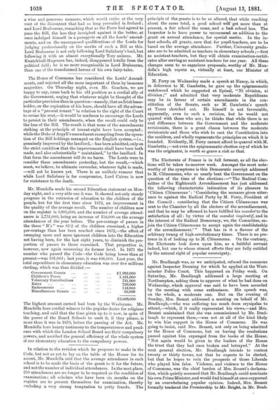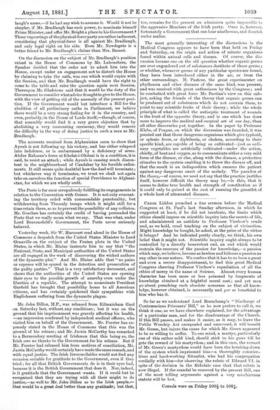Mr. Bradlaugh was, as we anticipated, refused the summons against
Inspector Denning for which he applied at the West- minster Police Court. This happened on Friday week. On Saturday, Mr. Bradlaugh addressed a large meeting at Northampton, asking them to approve of what he had done on Wednesday, which approval was said to have been accorded by the meeting. with some enthusiasm. His speech was, on the whole, a moderate one. But on the evening of Sunday, Mrs. Besant addressed a meeting on behalf of Mr. Bradlaugh,—who was suffering too much from erysipelas to attend,—which, if it really represented his views,—and Mrs. Besant maintained that she was commissioned by Mr. Brad- laugh to represent them,—was not at all of the kind likely to win him support in the House of Commons. He was going to insist, said Mrs. Besant, not only on being admitted to the House of Commons, but on having the resolutions passed against him expunged from the books of the House. "Not again would be given to the leaders of the House the trust that they had once broken and betrayed." At the next general election, Mr. Bradlaugh intends to contest twenty or thirty towns, not that he expects to be elected, but that he hopes to rain the prospects of those Liberals who played him false. Violence, and violence to the House of Commons, was the chief burden of Mrs. Besant's declama- tion, which quietly assumed that Mr. Bradlaugh could nominate his own Prime Minister, and would find himself at once supported by an overwhelming popular opinion. Indeed, Mrs. Besant formally tendered the Premiership to Mr. Bright, in Mr. Brad.
laugh's name,—if he had any wish to assume it. Would it not be simpler, if Mr. Bradlaugh has such power, to nominate himself Prime Minister, and offer Mr. Bright a place in his Government ? These vapourings of the physical-force party are rather indiscreet, considering that physical-force is all against Mr. Bradlaugh, and only legal right on his side. Even Mr. Newdegate is a better friend to Mr. Bradlaugh's claims than Mrs. Besant.































 Previous page
Previous page